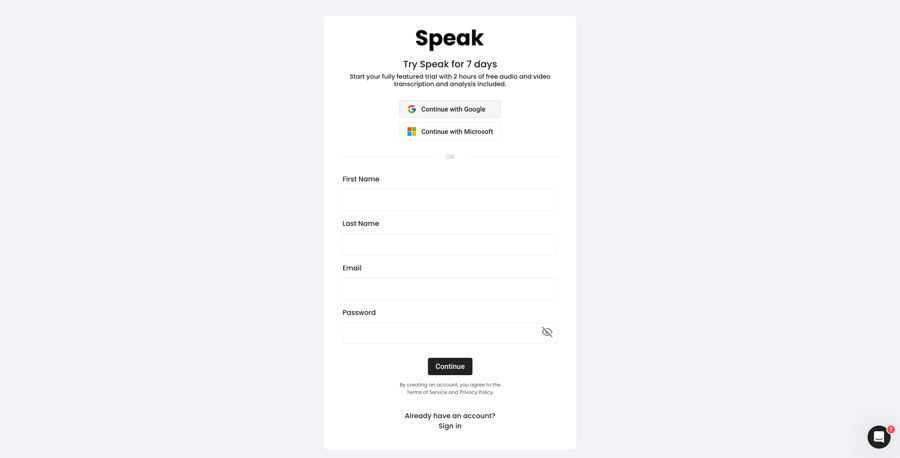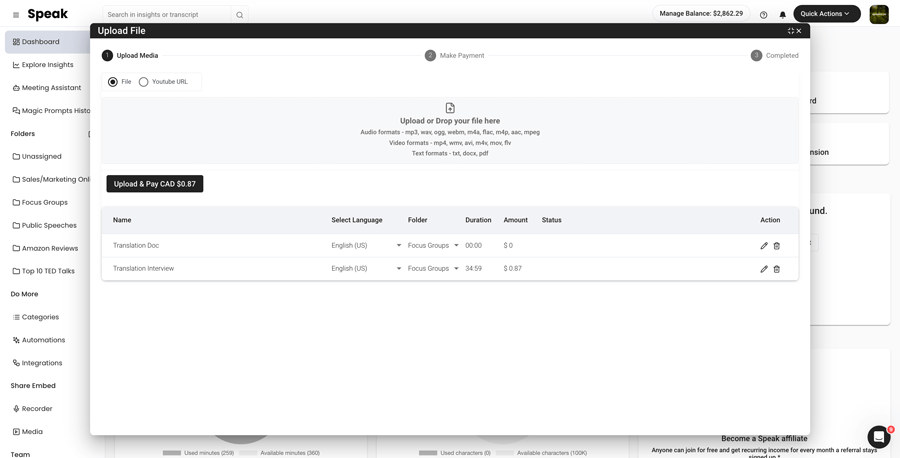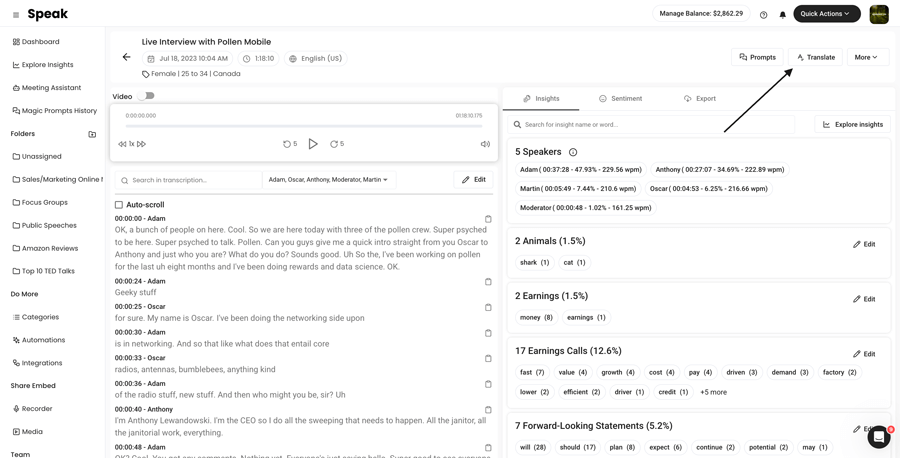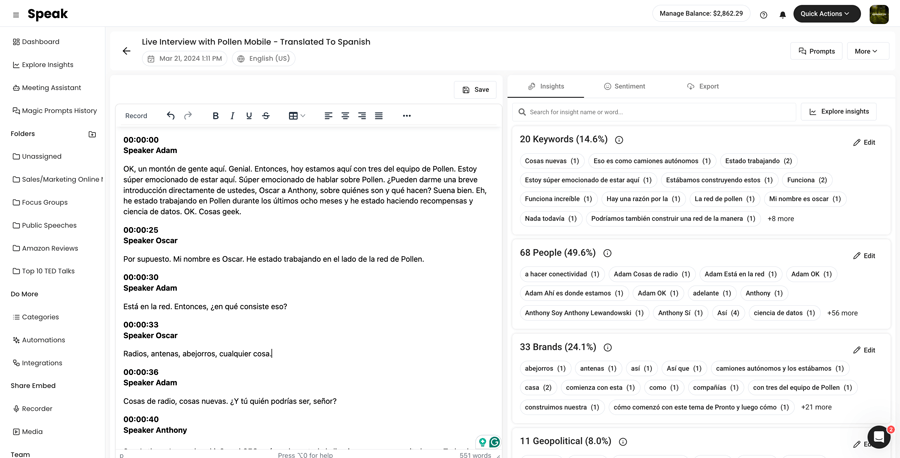How To Translate German to Latin
Translating German to Latin is super simple!

Step 1: Register for Speak
Register for Speak using this link.
Once you register, you can instantly begin translating your German to Latin file(s).

Step 2: Upload Your German file(s)
As soon as you log in, you will be redirected to the dashboard.
Once there, you can select the Quick Action "New Upload".
In Speak, you can seamlessly upload, transcribe and translate audio, video and text files all at once!

Step 3: Translate Your German file(s) to Latin
Once the file is uploaded, simply visit your file and select "Translate".
If it is an audio and video file, Speak will ask you if you want to keep the speaker names and timestamps in the translation.
Want to translate many files at once? No problem!
You can view the files you want to automatically translate from German to Latin from the folder level and instantly translate as many files as you need with our artificial intelligence translation in just a few clicks.

Step 4: That's It! View, Analyze, Modify & Export Your New Latin file(s)
Once the translation is done, you will be alerted and you will see a new document in the same folder your original file is in.
The file will be named the same but with a dash indicating that it is the translated version.
Need support with your German translation?
We are always here and happy to help at Speak!
Just send us a message on live chat on the bottom right corner and we will ensure you are set up for success.
Interested in translating German or other languages to different languages? View our entire list of supported translation languages here.
Automatic, accurate, instant AI translation from German to Latin is here for you.
Register for Speak using this link and begin translating German to Latin today.
The Unparalleled Value of Translating German to Latin in Today's World
In an era where the fusion of technology and language has opened up new frontiers for communication, translating from German to Latin is no longer a relic of the academic domain. It has evolved into a necessity across diversified fields, from research to dynamic business environments. At Speak AI, we've harnessed the power of NLP, large language models, and data visualization, introducing an innovative approach to translation that transcends traditional boundaries. This article explores the myriad benefits, fascinating use cases, and the incredible time and cost savings derived from employing advanced AI in translating German to Latin.
Why Translate German to Latin?
Understanding the value behind translating German to Latin requires diving into the unique positions both languages hold. German, a major European language, is a beacon of technology, innovation, and culture. Latin, though considered a 'dead language', still resonates strongly in the fields of medicine, law, theology, and scientific research. Bridging these languages through translation opens a gateway to enriching knowledge and facilitating a deeper understanding of historical texts, legal documents, and scientific research papers.
For Researchers and Academics
Researchers delving into historical, philosophical, or scientific studies often encounter Latin texts. Translating these to German can illuminate insights and theories that are otherwise obscured by language barriers. Automatic translation speeds up this process, allowing scholars to dedicate more time to analysis and less to deciphering texts.
For Businesses and Innovators
In the realm of international business and innovation, translating product descriptions, patents, or research findings from German to Latin (and vice versa) can significantly enhance clarity and legal understanding. This not only broadens market reach but also ensures compliance with international standards.
Embracing the Future with AI Translation
Speak AI's integration of advanced AI technology revolutionizes the traditional translation process. Utilizing NLP and generative AI, our tools offer accurate, context-aware translations that preserve the original meaning and tone.
Enhanced Accuracy and Consistency
Our AI-powered translator ensures that every German word translated to Latin maintains its intended meaning, mitigating common errors associated with manual translation.
Remarkable Time and Cost Savings
The efficiency of AI translation drastically reduces the time required to translate texts, directly translating to cost savings for researchers and businesses. This allows for a quicker turnaround on projects and a faster time-to-market for products entering new regions.
Accessibility for All
With Speak AI’s translation software, valuable Latin texts become more accessible to German speakers. This fosters a greater appreciation and understanding of historical works and scientific materials.
Unlocking New Potentials
By transcending linguistic barriers between German and Latin, we unlock new potentials in research, education, and business. Speak AI is dedicated to providing the tools you need to explore these untapped resources, offering state-of-the-art translation services that cater to an array of needs.
The Speak AI Advantage
With a 4.9 rating on G2 and a user base of over 150K, Speak AI stands at the forefront of language translation technology. Our AI Meeting Assistant further exemplifies this leadership, bringing automatic transcription and analysis capabilities to your online meetings.
Celebrating Languages: German and Latin
Before we delve into the practical applications and benefits of translating German to Latin, let's explore the rich tapestry of these languages' histories, their contemporary relevance, and some fascinating facts.
German: A Literary and Scientific Powerhouse
German is the most widely spoken native language in the European Union, with over 100 million native speakers. It's the lingua franca of Central and Eastern Europe and holds significant historical and cultural importance in literature, philosophy, and science.
Latin: The Foundation of the Western Linguistic Tradition
Latin, though no longer spoken in daily contexts, remains influential in the realms of science, theology, and law. It is the root of the Romance languages and continues to be used in academic, legal, and scientific nomenclature.
Exploring the Fascinating Landscape of German and Latin
Key Differences and Intriguing Similarities
The structural differences between German and Latin are pronounced, with German being a fusional language rich in inflections, whereas Latin's highly inflected nature offers a different set of challenges and opportunities for linguists and translators.
Despite these differences, both languages share a common history that dates back millennia, influencing each other through the ages. This intertwined history adds a layer of complexity and richness to the translation process, making it as much an art as it is a science.
In Conclusion
Translating German to Latin is more than just converting words from one language to another; it's about bridging cultures, histories, and knowledge domains. With Speak AI's cutting-edge technology, this process is not only achievable but also efficient, accurate, and deeply enriching. Whether you're a researcher, a business, or simply a language enthusiast, the power to explore and connect with the vast reservoirs of knowledge preserved in these languages is now within reach.
Embrace the future of translation with Speak AI and unlock the full potential of your texts, research, and innovations. Discover the true value of translating German to Latin today.
FAQ:
What Locations are German and Latin Popular?
German enjoys widespread use in Germany, Austria, Switzerland, Belgium, and Luxembourg, boasting over 100 million native speakers. Latin, while not natively spoken, holds significant importance globally in academic, legal, and scientific communities.
What are Some Fun Facts About German and Latin?
German has a unique word, "Kummerspeck," which refers to weight gained from emotional eating. Latin, despite being a "dead language", is still the official language of the Vatican City.
What are the Differences and Similarities Between German and Latin?
The primary difference lies in their use and structure: German is a living, evolving language, while Latin is primarily used in written form in academic and historical contexts. Both languages, however, have greatly influenced the development of Western thought, literature, and science.
Translate German To These Other Supported Languages:
- Translate German-to-Afrikaans
- Translate German-to-Albanian
- Translate German-to-Amharic
- Translate German-to-Arabic (Egypt)
- Translate German-to-Arabic (Iraq)
- Translate German-to-Arabic (Israel)
- Translate German-to-Arabic (Jordan)
- Translate German-to-Arabic (Kuwait)
- Translate German-to-Arabic (Lebanon)
- Translate German-to-Arabic (Oman)
- Translate German-to-Arabic (Palestinian Authority)
- Translate German-to-Arabic (Qatar)
- Translate German-to-Arabic (Saudi Arabia)
- Translate German-to-Arabic (Syrian Arab Republic)
- Translate German-to-Arabic (United Arab Emirates)
- Translate German-to-Arabic Modern Standard (Bahrain)
- Translate German-to-Armenian
- Translate German-to-Assamese
- Translate German-to-Aymara
- Translate German-to-Azerbaijani
- Translate German-to-Bambara
- Translate German-to-Basque
- Translate German-to-Belarusian
- Translate German-to-Bengali
- Translate German-to-Bhojpuri
- Translate German-to-Bosnian
- Translate German-to-Bulgarian
- Translate German-to-Catalan
- Translate German-to-Cebuano
- Translate German-to-Chinese (Simplified)
- Translate German-to-Chinese (Traditional)
- Translate German-to-Corsican
- Translate German-to-Croatian
- Translate German-to-Czech
- Translate German-to-Danish
- Translate German-to-Dari
- Translate German-to-Dhivehi
- Translate German-to-Dogri
- Translate German-to-Dutch
- Translate German-to-English
- Translate German-to-English (Australia)
- Translate German-to-English (Indian)
- Translate German-to-English (Irish)
- Translate German-to-English (New Zealand)
- Translate German-to-English (Scottish)
- Translate German-to-English (South African)
- Translate German-to-English (United Kingdom)
- Translate German-to-English (United States)
- Translate German-to-Esperanto
- Translate German-to-Estonian
- Translate German-to-Ewe
- Translate German-to-Farsi (Persian)
- Translate German-to-Filipino Tagalog
- Translate German-to-Finnish
- Translate German-to-French
- Translate German-to-French (Canada)
- Translate German-to-Frisian
- Translate German-to-Galician
- Translate German-to-Georgian
- Translate German-to-German
- Translate German-to-German (Swiss)
- Translate German-to-Greek
- Translate German-to-Guarani
- Translate German-to-Gujarati
- Translate German-to-Haitian Creole
- Translate German-to-Hausa
- Translate German-to-Hawaiian
- Translate German-to-Hebrew
- Translate German-to-Hindi
- Translate German-to-Hmong
- Translate German-to-Hungarian
- Translate German-to-Icelandic
- Translate German-to-Igbo
- Translate German-to-Ilocano
- Translate German-to-Indonesian
- Translate German-to-Irish
- Translate German-to-Italian
- Translate German-to-Japanese
- Translate German-to-Javanese
- Translate German-to-Kannada
- Translate German-to-Kazakh
- Translate German-to-Khmer
- Translate German-to-Kinyarwanda
- Translate German-to-Konkani
- Translate German-to-Korean
- Translate German-to-Krio
- Translate German-to-Kurdish
- Translate German-to-Kurdish (Sorani)
- Translate German-to-Kyrgyz
- Translate German-to-Lao
- Translate German-to-Latin
- Translate German-to-Latvian
- Translate German-to-Lingala
- Translate German-to-Lithuanian
- Translate German-to-Luganda
- Translate German-to-Luxembourgish
- Translate German-to-Macedonian
- Translate German-to-Maithili
- Translate German-to-Malagasy
- Translate German-to-Malay
- Translate German-to-Malayalam
- Translate German-to-Maltese
- Translate German-to-Maori
- Translate German-to-Marathi
- Translate German-to-Meiteilon (Manipuri)
- Translate German-to-Mizo
- Translate German-to-Mongolian
- Translate German-to-Myanmar (Burmese)
- Translate German-to-Nepali
- Translate German-to-Norwegian
- Translate German-to-Nyanja (Chichewa)
- Translate German-to-Odia (Oriya)
- Translate German-to-Oromo
- Translate German-to-Pashto
- Translate German-to-Persian
- Translate German-to-Polish
- Translate German-to-Portuguese
- Translate German-to-Portuguese (Brazilian)
- Translate German-to-Portuguese (Portugal)
- Translate German-to-Punjabi
- Translate German-to-Quechua
- Translate German-to-Romanian
- Translate German-to-Russian
- Translate German-to-Samoan
- Translate German-to-Sanskrit
- Translate German-to-Scots Gaelic
- Translate German-to-Sepedi
- Translate German-to-Serbian
- Translate German-to-Sesotho
- Translate German-to-Shona
- Translate German-to-Sindhi
- Translate German-to-Sinhala
- Translate German-to-Sinhala (Sinhalese)
- Translate German-to-Slovak
- Translate German-to-Slovenian
- Translate German-to-Somali
- Translate German-to-Spanish
- Translate German-to-Spanish (Mexico)
- Translate German-to-Sundanese
- Translate German-to-Swahili
- Translate German-to-Swedish
- Translate German-to-Tajik
- Translate German-to-Tamil
- Translate German-to-Tatar
- Translate German-to-Telugu
- Translate German-to-Thai
- Translate German-to-Tigrinya
- Translate German-to-Tsonga
- Translate German-to-Turkish
- Translate German-to-Turkmen
- Translate German-to-Twi (Akan)
- Translate German-to-Ukrainian
- Translate German-to-Urdu
- Translate German-to-Uyghur
- Translate German-to-Uzbek
- Translate German-to-Vietnamese
- Translate German-to-Welsh
- Translate German-to-Xhosa
- Translate German-to-Yiddish
- Translate German-to-Yoruba
- Translate German-to-Zulu



